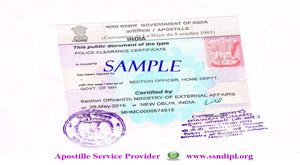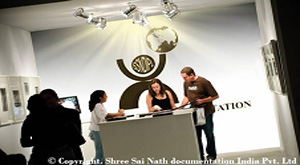
Apostille
Apostille is the simplified certification of public documents (including notarized), for their international use in all nations that have joined the Apostille Section of the Hague Convention. Signatory countries have agreed under the Apostille Section of the Hague Convention to recognize public documents certified by the “Apostille”. This certification ensures that public documents are valid within the country where the document was originally issued or notarized. The main function of the Apostille is to certify the authenticity of the signature on the document (i. e: State Registrar, County Clerk, Judge, Vital Records Officer or Notary Public). The Apostille also certifies the capacity in which the person signing the document acted and the identity of any stamp or seal affixed to the document. The Apostille is a one page document embossed with the Great Seal of a State (see sample image) and includes the facsimile signature of the individual issuing the certificate. There are currently over 75 member states of the Hague convention, and in the future, many other countries will join the Apostille Section of the Hague Convention to be able to recognize the Apostille for the international legalization of documents. The Apostille is applied only to public documents, signed by an authority or official connected with a court or tribunal of the State (including documents issued by an administrative, constitutional or ecclesiastical court or tribunal, a public prosecutor, a clerk or a process-server); administrative documents, notarial acts, and official certificates which are placed on documents signed by persons in their private capacity, such as official certificates recording the registration of a document or the fact that it was in existence on a certain date and official and notarial authentications of signatures. Almost every kind of document including: Birth Certificate, Adoption Certificate, Marriage Certificate, Divorce Decree, Death Certificate, Power of Attorney, School Diploma and/or Transcripts, Corporate Documents, Affidavits, Identity documents and/or Passports, Deeds and Wills, Agreements, Bills of Sale, Proof of Ownership, Private Documents.

Attestation
The literary meaning of the Attestation is “The act of attending the execution of a document and bearing witness to its authenticity, by signing one's name to it to affirm that it is genuine. The certification by a custodian of records that a copy of an original document is a true copy, which is demonstrated by his/her signature on the certificate. The attestation authorities for general documents in India are Notary Public, any Principal of a Secondary or Higher Secondary School or College or University, any Section Officer or Gazetted Officer of Government of India etc. but points to be noted that the above said authorities are entitled to attest the true copy of the documents. When an individual is planning to go abroad, then the individual’s original testimonials to be attested and to attest the same, Ministry of External Affairs, Government of India, has gave the power to various State’s Home Department, General Administrative Department, Higher Education Department or Sub Divisional Magistrate, New Delhi etc. After completion the attestation process from the above said authorities in India, the documents could be attested by the Ministry of External Affairs, New Delhi further it may be attested by the respective Embassy

Authentication
Authentication is the act of confirming the truth of an attribute of a datum or entity. This might involve confirming the identity of a person, tracing the origins of an artifact, ensuring that a product is what its packaging and labeling claims to be, or assuring that a computer program is a trusted one.
There are three types of techniques for doing Authentication
The first type authentication is accepting proof of identity given by a credible person who has evidence on the said identity or on the originator and the object under assessment as his artifact respectively.
The second type authentication is comparing the attributes of the object itself to what is known about objects of that origin. Attribute comparison may be vulnerable to forgery. In general, it relies on the fact that creating a forgery indistinguishable from a genuine artifact requires expert knowledge, that mistakes are easily made, or that the amount of effort required to do so is considerably greater than the amount of money that can be gained by selling the forgery. Criminal and civil penalties for fraud, forgery, and counterfeiting can reduce the incentive for falsification, depending on the risk of getting caught.
The third type authentication relies on documentation or other external affirmations. For example, the rules of evidence in criminal courts often require establishing the chain of custody of evidence presented. This can be accomplished through a written evidence log, or by testimony from the police detectives and forensics staff that handled it. Some antiques are accompanied by certificates attesting to their authenticity. External records have their own problems of forgery and perjury, and are also vulnerable to being separated from the artifact and lost.
Currency and other financial instruments commonly use the first type of authentication method. Bills, coins, and cheques incorporate hard-to-duplicate physical features, such as fine printing or engraving, distinctive feel, watermarks, and holographic imagery, which are easy for receivers to verify.
Consumer goods such as pharmaceuticals, perfume, fashion clothing can use either type of authentication method to prevent counterfeit goods from taking advantage of a popular brand's reputation (damaging the brand owner's sales and reputation). A trademark is a legally protected marking or other identifying feature which aids consumers in the identification of genuine brand-name goods
About Us

OUR VISION
Be the global leader in the field of Attestation, Authentication, Legalization, Apostille and Embassy Attestation.
OUR MISSION
Shree Sai Nath Documentation India Pvt. Ltd. is committed to maintaining Customer Satisfaction, Trust and Integrity by delivering quality services conforming to industry best practices and continuous process improvement.
OUR VALUES
Quality at foundation of service delivery Empowerment at all levels to hearten 'can do' approach Team fortitude Continuous learning and development Cultural multiplicity Corporate Residency Bringing common people collectively to do astonishing things
WHY WE
Sustained High Quality Service delivery Across the Globe Serving quality under one roof Servicing clients in high security zones Continuously trained and highly motivated work force Quick Transition 97% Client retention Benchmark Attrition rate across the Industry Value added services
BACKGROUND
Shree Sai Nath Documentation India Pvt. Ltd. is one of the trusted Document Authentication, Attestation, Apostille and Embassy Attestation consultants centrally located in New Delhi. The organization is engaged in the same field since 1998. The firm is managed by a group of professionally experienced, dedicated, motivated and high skilled associates to offer our valued customers very efficient, fast and reliable services with a very reasonable price at their door steps, which is truly unmatched by others. Genuine documentation and hassle free service delivery are the prime commitment of the organization. Thousands of delighted Individuals as well as Organizations across the World have made this organization an unbeatable leader in this field.
Shree Sai Nath Documentation India Pvt. Ltd. Service delivery capability across non-core segments has pioneered all services in the field of Document Attestation, Authentication, Apostille and Embassy Attestation under one roof and provides most reliable services to all the individuals as well as organizations across the globe. The service may include the Attestation Authentication of various documents or various certificates from different Indian States, Ministry of External Affairs, New Delhi and Embassies located in various parts of India. The entire process could be completed by keeping two points in mind, one is the standard requirement of the respective country, which the document is being attesting for and another is the requirement of the Individuals or the Organizations for their specific needs.
Contact Details
Shree Sai Nath Documentation India Pvt. Ltd
Address: O – 1st, 21 & 22, 2nd Floor
Madangir, New Delhi 110062, India
Telephone:+91-11-26052605 / 26051031 / 26051874 / 26051875
Cell +91-9873937874 / +91-9266652072
Email: care@ssndipl.com ; info@documentation.co.in
Website: www.ssndipl.com
About Company
We are Provide All Type of Indian Educational, Non Educational and Commercial Documents or Certificates Attestation, Apostille, Legalization Services Provider
Service
(c) Copyright. Shree Sai Nath Documentation India Pvt. Ltd



